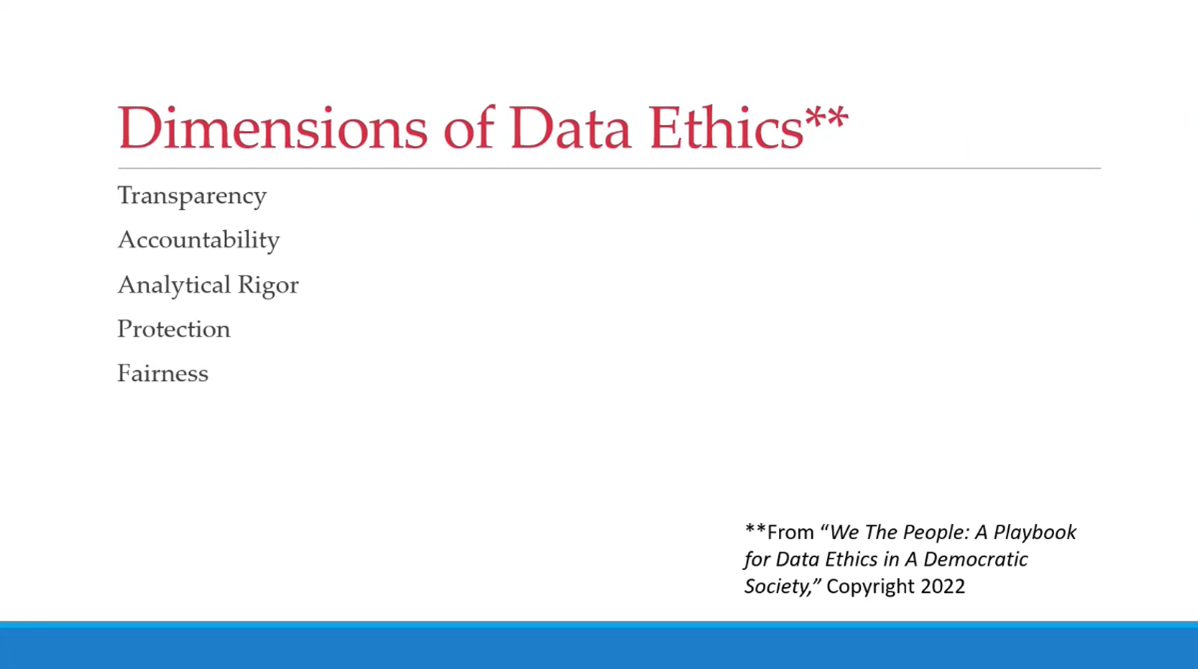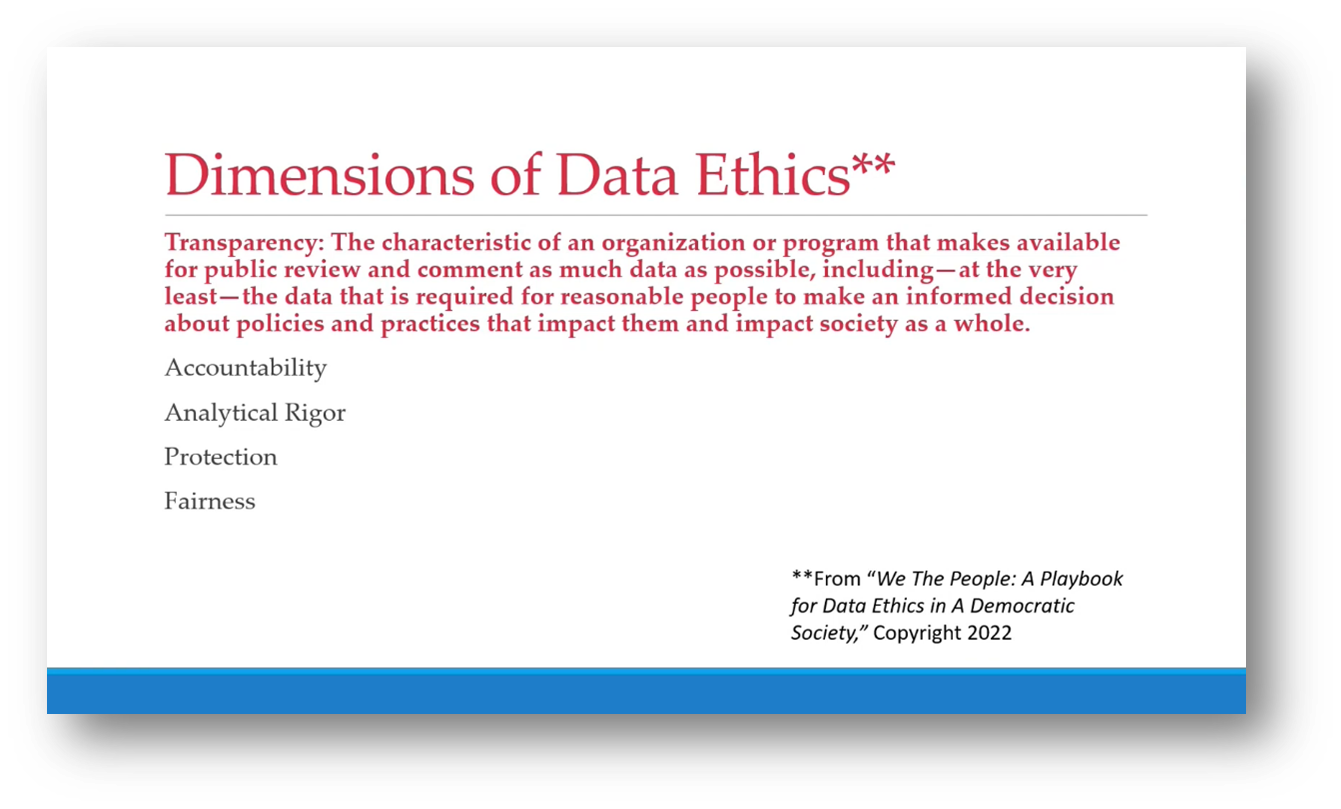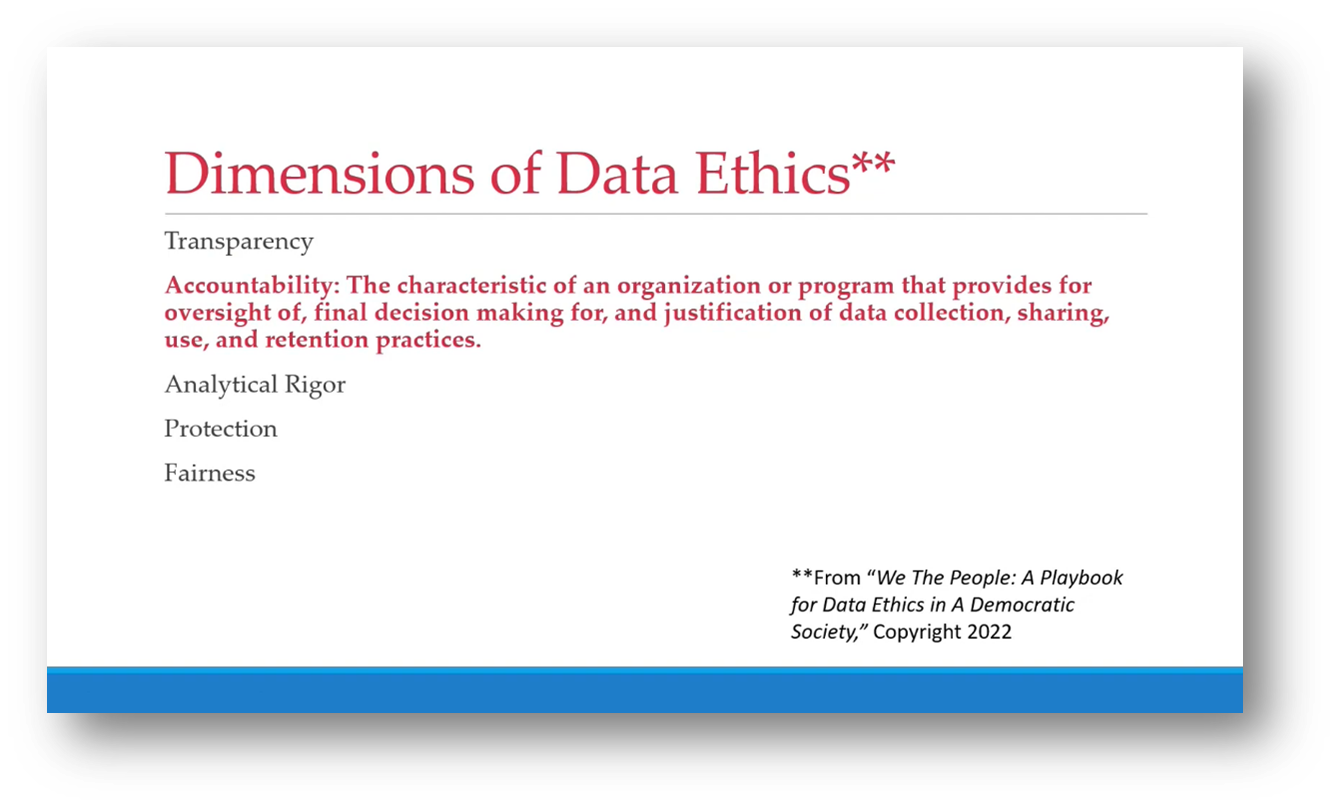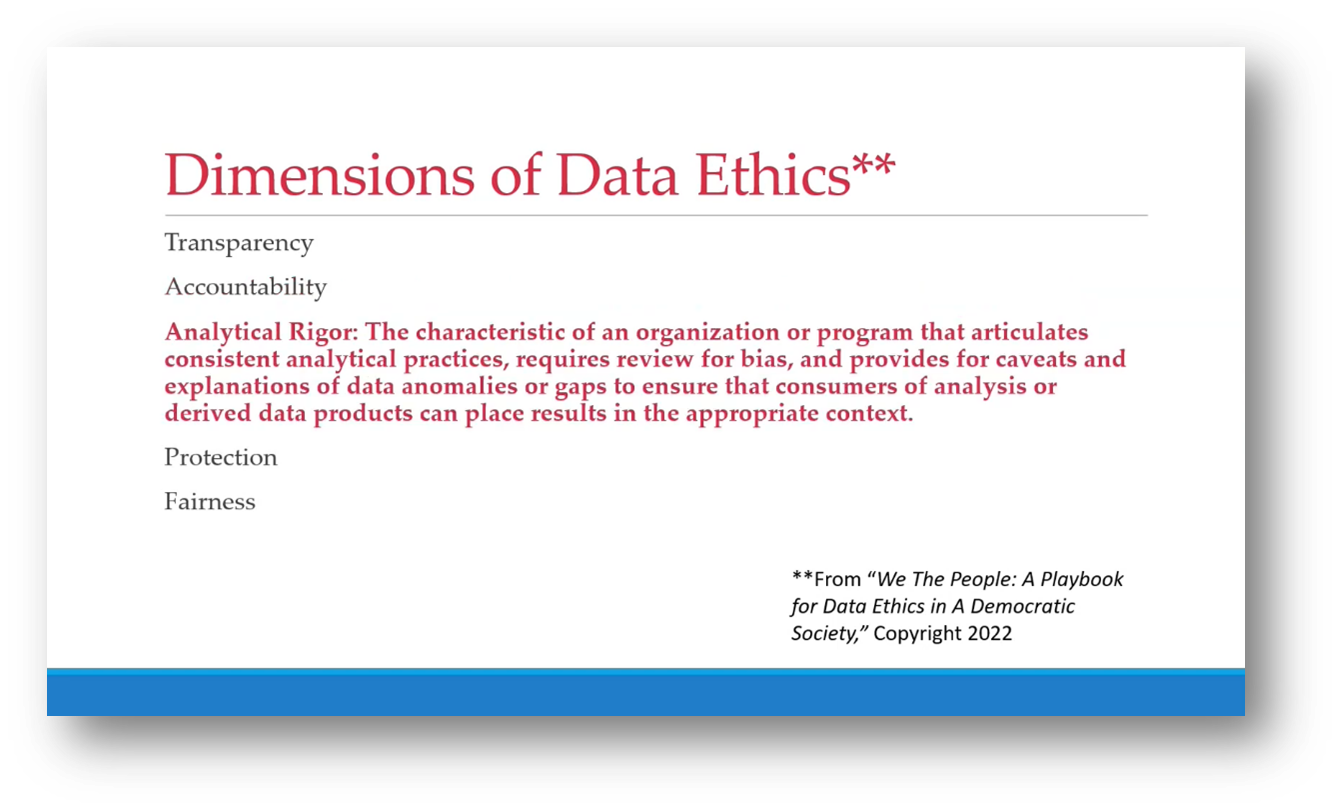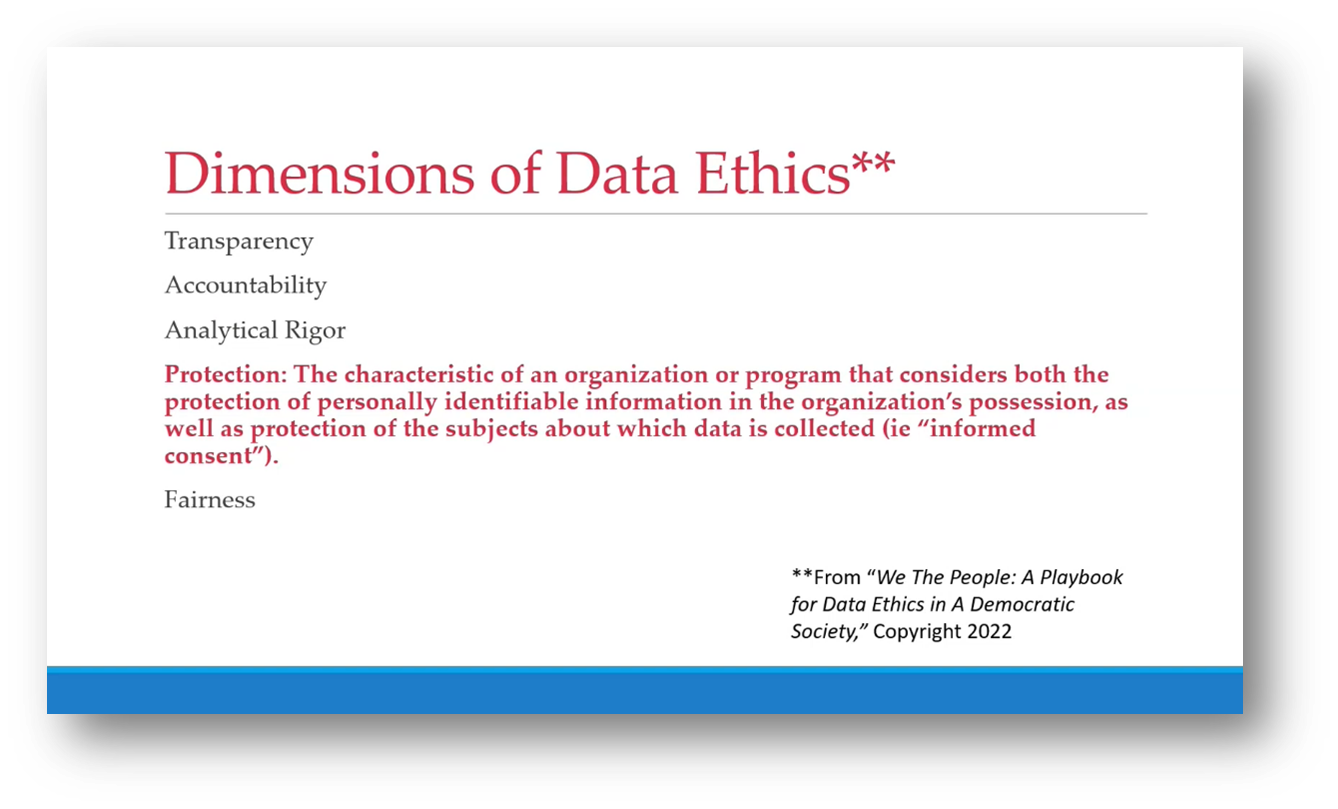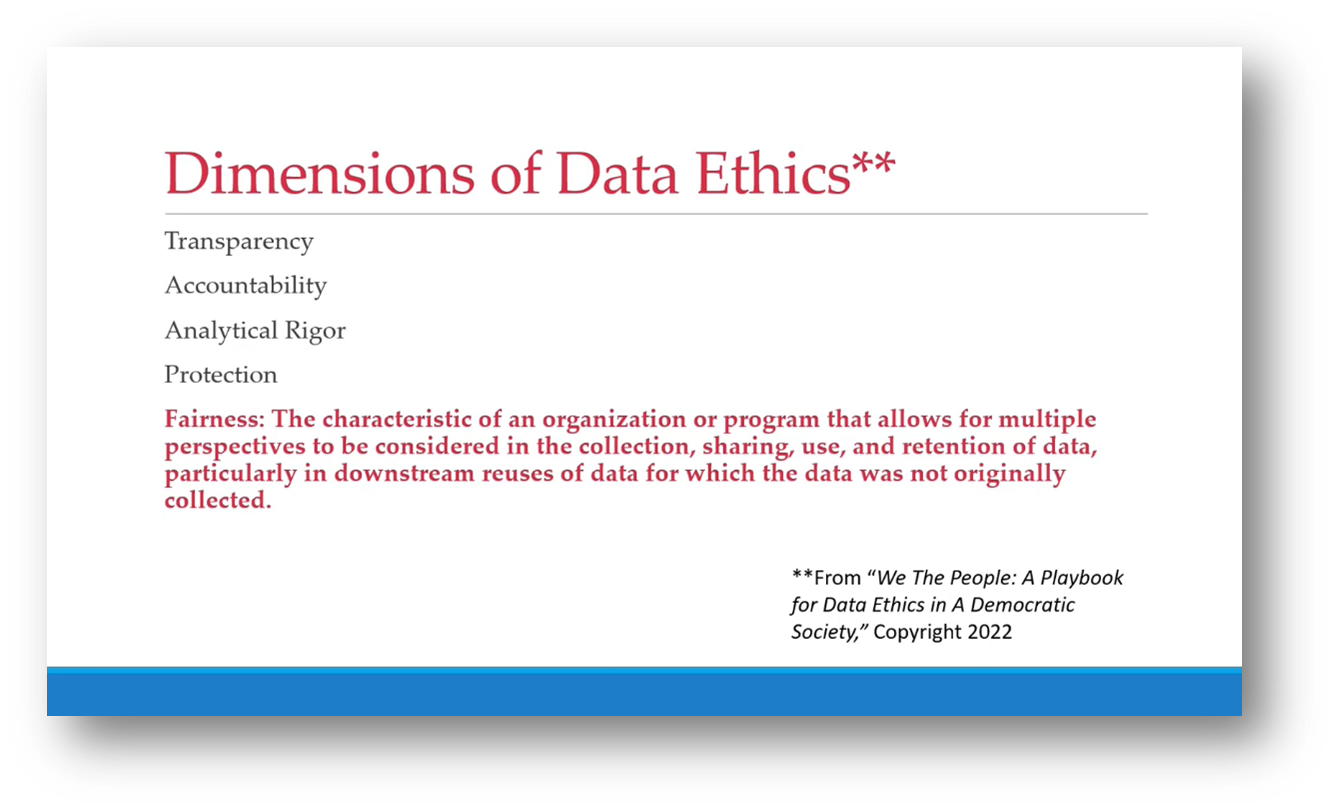We the People – A Playbook on Data Ethics with Kathy Rondon
Executive Summary
This webinar, by Kathy Rondon, provides an overview of the key dimensions of data ethics, including transparency, accountability, ownership, and analytical rigour. It highlights the challenges in implementing publication ethics and data governance programs. Kathy emphasises the importance of informed consent and fairness in data ethics and the need for ethical considerations in program design. She also explores changing approaches to ethics and data collection and the importance of asking ethical questions in data collection. Overall, the webinar underscores the significance of data ethics and governance in ensuring a fair and just society.
Webinar Details
Title: WE THE PEOPLE – A PLAYBOOK ON DATA ETHICS WITH KATHY RONDON
Date: 14 December 2023
Presenter: Kathy Rondon
Meetup Group: Data Governance & Data Ethics
Write-up Author: Howard Diesel
Contents
The Importance of Data Ethics and Governance
Writing Approach for a Book on Data Ethics
Dimensions of Data Ethics in a Democratic Society
Transparency in Data Ethics
Transparency and Accountability in Data Collection
Importance of Accountability in Data Transparency and Ethics
Accountability in Data Governance
Importance of Data Ownership and Analytical Rigour in Data Governance
Challenges in Publication Ethics and Data Governance Programs
Importance of Data Curation and Ethics
The Importance of Informed Consent and Fairness in Data Ethics
The Importance of Ethical Consideration in Program Design
Changing Approaches to Ethics and Data Collection in a Democratic Society
Ethical Considerations in Data Collection and Definitions of Right
Importance of Asking Ethical Questions in Data Collection
The Importance of Data Ethics and Governance
Kathy Rondon opens the webinar by introducing herself as a data practitioner in the public sector in the U.S. Her focus for the webinar is on data governance and ethics. Kathy shares her belief that the data governance framework has a wide range of applications. Unfortunately, the U.S. is behind Europe and Canada in terms of data governance and privacy regulations. Kathy's background is in English literature and international affairs, which she uses to approach data governance from a policy angle. She's grateful to Tony Shaw and Dataversity for providing her a platform to speak and train on data governance. Kathy's first book was inspired by her experiences at data governance conferences and mainstream news.
Figure 1 About the Author
Writing Approach for a Book on Data Ethics
At first, data-related projects were mainly focused on making money and streamlining processes through digital transformation. However, as more media reports surfaced, it became clear that there were issues with how data was being handled and/or misused due to the excitement surrounding its potential. Unfortunately, discussions around data ethics focused on protecting privacy and did not address other critical ethical considerations.
Kathy brought up her experience in policy implementation for data collection and handling. Instead of using graphs or charts, Kathy mentions that her book features scenario-based narratives. She also drew on stories, news reports, and personal experiences to provide relatable examples and analogies. Additionally, Kathy adds the direct interviews she conducted with data practitioners to gain deeper insights into specific topics covered in the book.
Figure 2 "Why Did I Write This Book?"
Figure 3 "How Did I Approach Writing?"
Dimensions of Data Ethics in a Democratic Society
In her book, Kathy explores the topic of data ethics and emphasises the value of asking thoughtful questions rather than relying on a simple compliance checklist. She stresses the importance of having an ethical framework, as the right answer may vary depending on various factors. She delves into the various dimensions of data ethics in a Democratic Society, including transparency, accountability, analytical rigour, protection, and fairness. These dimensions are akin to data quality frameworks but specifically focus on ethical concerns. Finally, Kathy encourages readers to share their ideas and perspectives on data ethics to continue the dialogue on this crucial topic.
Figure 4 "What Do I Hope To Accomplish?"
Figure 5 Dimensions of Data Ethics
Transparency in Data Ethics
Making data available for public review and comment is a key characteristic of transparent organisational programs. In most countries, citizens have the right to access information about their government's operations through the Freedom of Information Act (FOIA). However, the implementation of FOIA varies across countries and in the US, there is a backlog in responding to requests due to outdated processes and technology. This lack of information hinders citizens from making informed decisions about their government's operations, which is a data ethics issue. Similarly, in Saudi Arabia, the National Data Management Office (NDMO) oversees 15 domains of data management, including Freedom of Information. The NDMO allows people to request information through a data subject request system.
Figure 6 Dimensions of Data Ethics - Transparency
Transparency and Accountability in Data Collection
Understanding the information authorities collect on citizen behaviour or development is important. It is also necessary to measure and compare the data presented on websites with the actual data collected by authorities. Kathy notes that a recent example is the Freedom of Information Act request for the development data of the Pfizer COVID-19 vaccine. The FDA initially provided only 500 pages and planned to provide 500 more pages per month, resulting in a 50-year response time. Adapting to new technological abilities in data processing and response time is essential. Transparency can be measured by tracking the decrease in backlogs and the number of lawsuits related to information access.
Importance of Accountability in Data Transparency and Ethics
When assessing data transparency in federal agencies, metrics can be incredibly useful. However, private organisations can sometimes be less transparent due to their use of proprietary labels. To combat this, it is essential to have guardrails and requirements in place to ensure data transparency within private sector organisations. Designated parties within these organisations must be held accountable for all data collection, sharing, use, and retention. This responsibility falls to GDPR's data protection officers and Chief data officers in the US. The maturity of a data governance program reflects the level of accountability in data ethics. Lack of accountability can result in unintentional negative consequences for individuals or society. Measuring accountability can be linked to the maturity of the data governance program. Accountability also plays a crucial role in data ownership and is directly related to the maturity of an organisation as a whole.
Figure 7 Dimensions of Data Ethics - Accountability
Accountability in Data Governance
Accountability is crucial in governance programs, regardless of an organisation's maturity level. Even without an officially designated data owner, someone must be responsible. Ownership in data governance is linked to accountability, but it differs from accountability for a data asset and the overall collection program. A well-developed data ownership model can exist at the data asset level, even without a well-developed accountability program. The concept of "custodianship," or being a trustee for the data, involves caring for it on behalf of someone else. However, specific roles and responsibilities in data governance lack consensus and require further development, as outlined in DAMA-DMBOK version 2.
Importance of Data Ownership and Analytical Rigor in Data Governance
Effective management of a data governance program hinges on establishing a clear data ownership role. The maturity of the program also depends on additional elements, such as having a comprehensive set of practices and procedures across the organization, as well as a well-defined business glossary. Executives carry the fiduciary responsibility for data governance, which cannot be delegated. It's advisable to have one primary accountable party while allowing multiple responsible parties to share the workload.
To ensure accountability, data privacy laws designate an information officer. Maintaining analytical rigor is crucial, which involves applying consistent analytical practices, actively checking for bias, and explaining any anomalies or gaps in the data. Without established analytical standards and proper training, unethical data practices can occur. Additionally, a lack of citation standards and inadequate data retention can impede the verification of results in data analysis.
Figure 8 Dimensions of Data Ethics - Analytical Rigor
Challenges in Publication Ethics and Data Governance Programs
The main objective of data governance and quality programs is to allow for data reuse over time. However, this approach may lead to post-hoc analysis outside the scientific method. It is crucial to have analytical standards in place to prevent any potential bias and cherry-picking of data in post-hoc analysis. In addition, ensuring the ethical use of data involves safeguarding it from hackers and implementing publication ethics and analytical rigour. Data can often mislead or deceive without proper analytical tradecraft standards and rigorous practitioner training. Managing publication ethics in universities and journals can be challenging, and different approaches have received criticism. Therefore, proper data governance programs should include inventorying and curating data, assigning unique identifiers, and defending research findings through citation.
Importance of Data Curation and Ethics
When discussing the data collection process, Kathy highlights the issue of disorganisation and lack of provenance information. She stresses the importance of data curation, a discipline often overlooked, which involves cataloguing, assigning unique identifiers, providing titles and descriptors, and tracing the lineage of the data. By curating data in this way, it can be properly cited, which is crucial for maintaining publication ethics. It is essential to have an accessible data repository that is categorised, curated, and catalogued to accurately cite data and allow others to access it through the provided citation.
The Importance of Informed Consent and Fairness in Data Ethics
Obtaining informed consent is essential to ensure the safety and protection of data and the individuals it pertains to. The further people are removed from the subjects of data collection, the higher the likelihood of ethical errors occurring. Acknowledging that personally identifiable data represents real individuals, not just data points, is crucial to avoid ethical dilemmas. Data ethics is vital to protecting data and the individuals it is linked to. A fair approach to data ethics is crucial, as it allows multiple perspectives to be considered. Data collection, sharing, use, and retention should be fair when using proxy datasets for AI and machine learning. It is important to consider who is involved in decision-making regarding data use to prevent unintentional exclusion. Considering multiple perspectives in data practices and policies, an inclusive approach is key to a mature data ethics approach.
Figure 9 Dimensions of Data Ethics - Protection
Figure 10 Dimensions of Data Ethics - Fairness
The Importance of Ethical Consideration in Program Design
In her book "Weapons of Math Destruction," Cathy O'Neill highlights how reusing data and algorithms for unintended purposes can have negative impacts. She stresses the importance of conducting ethical impact assessments before program implementation rather than addressing any negative consequences retrospectively. O'Neill recommends that program design should include both ethical and privacy impact assessments. The book follows the structure of the U.S. Constitution's preamble, with each chapter titled after one of its phrases. The chapter titled "Ensure Domestic Tranquility" explores the concept of consent concerning program design.
Figure 11 "A Quick Excerpt"
Changing Approaches to Ethics and Data Collection in a Democratic Society
During the 19th century, garment factory owners often claimed that their workers had the freedom to seek employment elsewhere if they were unhappy with the working conditions. However, all factories maintained poor conditions due to a lack of regulations and incentives. This situation mirrors the current issues surrounding data ethics, where companies assert that users can opt-out if they disagree with the terms and conditions. Yet, these terms are often similar across various companies, limiting true choice.
Today, the landscape of fair data collection and usage is being reevaluated by society, akin to the reforms aimed at improving working conditions for garment factory workers. The ethical standards for data usage are not universal; they vary based on individual cases. Additionally, a country's political system and context can greatly impact its approach to data ethics.
Ethical Considerations in Data Collection and Definitions of Right
The importance of government accountability for upholding ethical standards is acknowledged in Kathy’s book. The Organisation for Economic Co-operation and Development (OECD) and the Overseas Development Institute (ODI) recognise that the definition of "right" varies globally, regardless of whether a country is democratic or not. Therefore, there is a need for a more universal definition of rights, particularly regarding data collection. Cathy O'Neill advocates for a shift from individuals defining ethics to organisations defining ethics. ‘Weapons of Math Destruction’ concludes each chapter with ethical questions, such as the necessity of collecting excessive information and whether users should be informed about data collection practices.
Importance of Asking Ethical Questions in Data Collection
As a law enforcement agency with ongoing investigations, the National Security Agency keeps users in the dark about the information they collect. Ethical missteps usually occur not because people intentionally or unintentionally answer incorrectly but because they neglect to ask crucial ethical questions. Kathy closes the webinar by stressing the importance of asking ethical questions in good faith and addressing potential ethical problems. ODI provides a helpful set of questions, The Data Ethics Canvas, that do not define right or wrong but promote asking these questions at different stages of data collection.
If you would like to join the discussion, please visit our community platform, the Data Professional Expedition.
Additionally, if you would like to be a guest speaker on a future webinar, kindly contact Debbie (social@modelwaresystems.com)
Don’t forget to join our exciting LinkedIn and Meetup data communities not to miss out!






